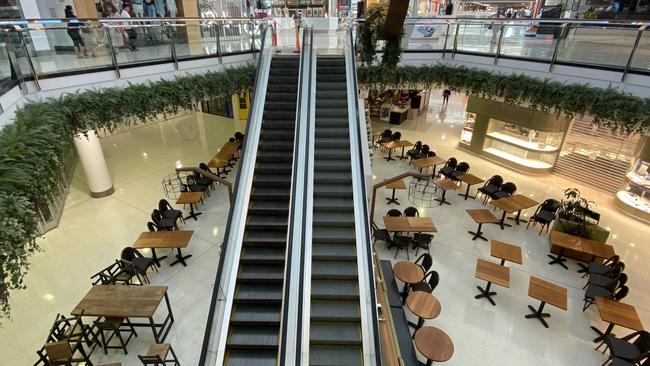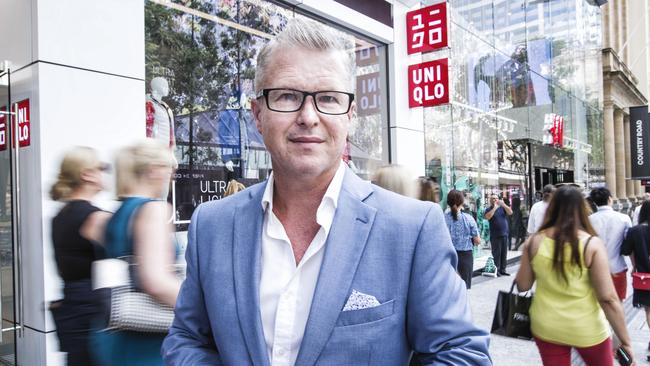Iconic brands could disappear as retail feels coronavirus hit
Iconic Australian brands could disappear forever by the end of the coronavirus pandemic, with experts warning the crisis is accelerating the “retail apocalypse” and companies won’t be rushing to reopen stores despite an ease in lockdowns.
QLD Business
Don't miss out on the headlines from QLD Business. Followed categories will be added to My News.
ICONIC Australian chains could disappear from shopping centres as experts warn that the “retail apocalypse” is being accelerated by lockdowns that have left centres deserted.
It comes as major Queensland shopping centres look to plot their way out of lockdown, with an announcement yesterday by Premier Annastacia Palaszczuk that non-essential shopping trips would be allowed.
Full guide to Queensland’s new easing of COVID-19 restrictions
Premier Annastacia Palaszczuk provides update on COVID-19 cases in Queensland
Coronavirus Gold Coast: Crowds flock to shopping centres
Coronavirus will change Queensland forever and it’s not all bad
The announcement has done little to buoy hopes of a quick recovery however, with stores that voluntarily closed likely to remain shut until the economy improves.
More healthcare services, groceries, so-called “dark stores” and focusing on hyper-local retail are all strategies that shopping centre giants are looking at as the sector recovers from lockdown.

But QUT Professor Gary Mortimer has warned that rules restricting non-essential travel may have sent the transition to online shopping into hyper drive.
Mr Mortimer, a renowned expert of Queensland’s retail sector, also warned that heavy and competitive discounting when reopening began would likely hurt the bottom line of already-struggling chains.
“That particular point for retailers is a moot point, because many retailers who were able to open made the voluntary choice to close anyway,” he said.
“Hopefully some retailers will take note and open those businesses. Certainly shopping centres would be very keen for retailers that have voluntarily closed to reopen.”
Even before the coronavirus restrictions came into force, Mr Mortimer said 2020 was already shaping up as a “retail apocalypse.”
Bardot, Australian Geographic, Jeanswest and Harris Scarfe were among a recent spate of high-profile brands entering into administration.

Mr Mortimer predicted the coronavirus would accelerate a number of other collapses.
“I would not be surprised to see a number of big brands enter voluntary administration,” he said.
“We’ve now had the impact of four or five weeks of store closures. That’s going to put some retailers in a very difficult situation.”
National Retail Association chief executive Dominique Lamb said small and medium-size retailers were most vulnerable, but that the whole industry would feel the effects of a recession.
“I think there are going to be some national brands in that boat,” Ms Lamb said.
“Retail was very difficult prior to (coronavirus) – we had the bushfires, we had figures that were declining.”
Ms Lamb said support for the sector was crucial, given it was the second largest employer in the country and Australia’s largest employer of young people.
She said strengthening store supply chains to withstand catastrophic disruptions would be a focus for many businesses moving out of lockdown.
“They’ll be looking at the hygiene factors in their stores. They’re also going to be shoring up their cash levels just to be sure.”

Despite the doom and gloom, two major shopping centre operators have confirmed they’re looking into strategies to survive in a post-coronavirus world.
AMP Capital, which owns Pacific Fair on the Gold Coast and Indooroopilly Shopping Centre on Brisbane’s westside, said health, wellness and medical services would all see rebounds off the back of COVID-19.
“Post-SARS in 2003, restaurants, entertainment and other leisure services saw a short term spike in activity as people left their homes eager to socialise again,” AMP Capital shopping centre marketing general manager Louise Raymond said.
“We are anticipating strong levels of customer demand for socially engaged services when they come out of lockdown.”

Ms Raymond said dark stores used to supply online deliveries were also likely to play a bigger role.
Lendlease, which operates Sunshine Plaza on the Sunshine Coast, said the crisis would hopefully make shoppers supper local brands.
“We’re continuing to work closely with our retailers and are supporting them on a case-by-case basis, depending on the impact to their business,” acting head of Lendlease’s retail division David McNamara said.
Shoppers Alicia and Jess said it was “a little” quiet as the pair went shopping in Brisbane City today.
“I’d be pretty happy if stores are open soon,” Alicia said.
“If the shops don’t open sooner, they might go bankrupt.”
She said she hadn’t seen the streets as quiet in her year living in Australia.
“There were still people, but it wasn’t as busy as it used to be.”
“I only went to the clothes stores, there were quite a lot of people (in them) actually.”



